Washing sliced mushrooms before cooking is unnecessary as long as you buy mushrooms from a reputable source. Mushrooms are typically grown on composted soil, making them relatively clean. Despite this, it is important to inspect the mushrooms carefully before cooking them and discard any bruised or visible contaminants.
Do I Need To Wash Sliced Mushrooms Before Cooking?
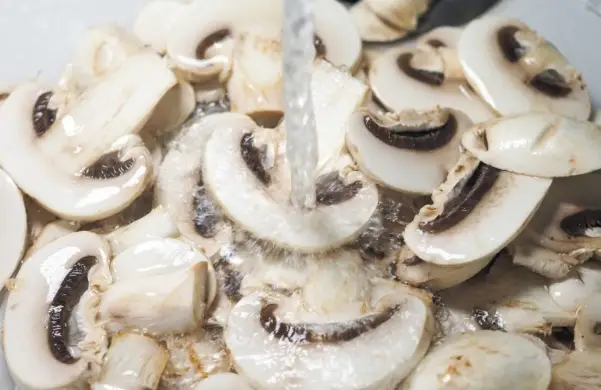
You can wash sliced mushrooms before cooking as dirt, and debris can stick in the mushroom’s gills, and some mushrooms may also have a protective coating that should be removed. Washing with cold water is enough, but if you want to be extra cautious, use a damp cloth or paper towel to rub away any dirt gently. When cooking, dry the mushrooms with a paper towel to avoid a soggy texture. It is important to note that soaking or rinsing sliced mushrooms in water can make them slimy and overcooked, so be sure not to do this.
The Benefits Of Washing Sliced Mushrooms
You might want to wash your sliced mushrooms before cooking for several reasons.
- Removing Dirt and Debris: Mushrooms grow in soil or on decaying organic matter, so it’s only natural that they accumulate dirt and debris. Washing sliced mushrooms helps remove lingering soil particles, ensuring a cleaner and more pleasant eating experience.
- Reducing Bacterial Contamination: Mushrooms can harbor bacteria such as Salmonella and E. coli. Washing them can help reduce the risk of foodborne illness by removing some of the bacteria that might be present.
- Improving Taste and Texture: Washing mushrooms can also improve their taste and texture by removing any grittiness caused by dirt or debris. Additionally, rinsing sliced mushrooms can help remove any sliminess that may have developed during storage.
Alternatives To Washing Sliced Mushrooms
- Brushing: Brushing is always preferred when it comes to cleaning mushrooms. If you are using pre-cut supermarket mushrooms, gently brush the mushroom slices with a soft bristle brush or damp cloth to remove any dirt or debris that may be present.
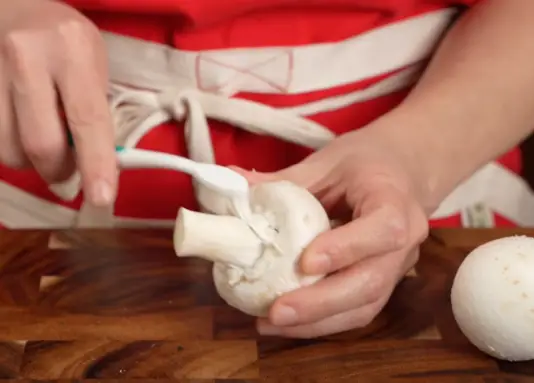
Cleaning Mushrooms with brush - Wiping: Mushrooms with a damp cloth or paper towel are usually sufficient for removing dirt and other particles. With a light touch, you can wipe mushrooms with a wet towel and let them dry at room temperature. This can help to maintain the mushroom’s natural flavor and texture.
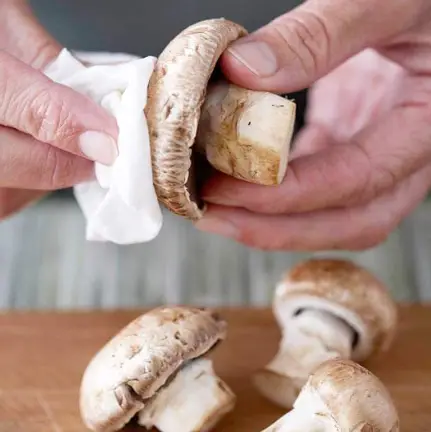
Wiping Mushrroms - Spinning: Place the mushroom in the salad spinner and spin the handle for a few seconds. The spinning will help to remove dirt, grit, and other particles that may be adhered to the mushroom.
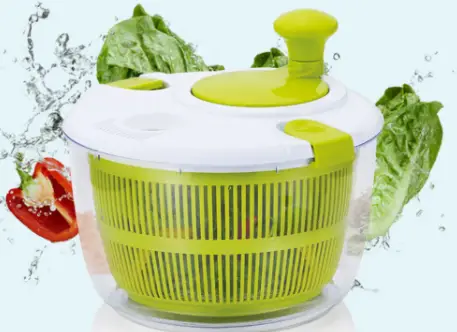
Spinning Mushroms - Rinsing: The most effective way to clean mushrooms is by rinsing them in cold water. This will help loosen the dirt on their surfaces and any other debris attached to them. It’s important not to soak them, as this can cause the mushrooms to become soggy and lose flavor.
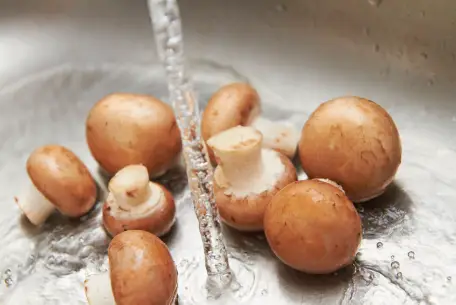
Rinsing with cold water
How To Clean Morel Mushrooms?
Step 1: Start by brushing off any dirt or debris from the mushrooms with a soft brush.
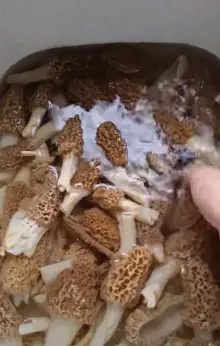
Step 2: Soak the mushrooms in cold water for about 10 minutes to help release any remaining dirt and debris.
Step 3: Gently swirl them around a few times but do not scrub them, as this can damage the delicate flesh of the morel.
Step 4: Remove them from the water, place them onto a kitchen towel or paper towel, and pat dry.
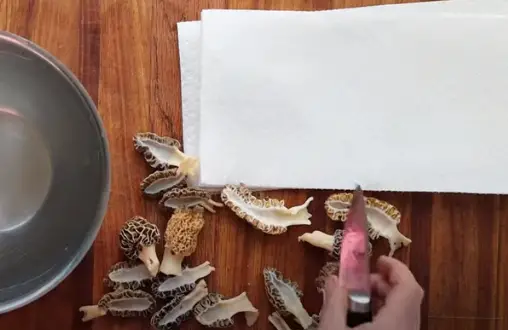
Step 5: Use a paring knife to cut off any remaining dirt or debris on the mushrooms.
Step 6: Slice the morels in half lengthwise to inspect for any insects or bugs in the mushrooms. If present, discard them and do not eat them.
Selecting And Storing Mushrooms
- Choose fresh mushrooms that are firm, dry, and not slimy.
- Avoid mushrooms with brown or discolored spots.
- Refrigerate mushrooms in a paper bag to help absorb moisture and keep them fresh longer.
- Try to consume your mushrooms soon after they’re purchased because they can lose their flavor after a few days.
- Store mushrooms away from other foods, such as onions and garlic, to avoid cross-contamination that could lead to food poisoning.
- If you need to store them for longer than a few days, try freezing them in an airtight container or bag.
- Cooked mushrooms can also be frozen in an airtight container or bag for up to three months.
- When cooking mushrooms, always ensure they reach the appropriate temperature before eating. If you’re baking them or using them in a sauce, try to get them to 165° F (74° C) or higher.
- Remember that different types of mushrooms may require different cooking times, so read the instructions for your recipe or check the mushrooms for doneness.
- Always discard moldy or slimy mushrooms, and ensure you properly wash them with cool running water before consuming them.
- Never eat raw mushrooms, as they can cause food poisoning due to naturally occurring bacteria. If you want to add a crunchy texture to salads or other dishes, consider giving them a quick sauté or roast.
By following these simple guidelines, you can ensure that your mushroom dishes are safe and flavorful.
FAQs
Are all mushrooms edible?
No, not all mushrooms are edible. While many delicious and nutritious varieties exist, some mushrooms are toxic and can cause severe health issues if consumed. It is important to accurately identify a mushroom before consuming it.
Can I grow mushrooms at home?
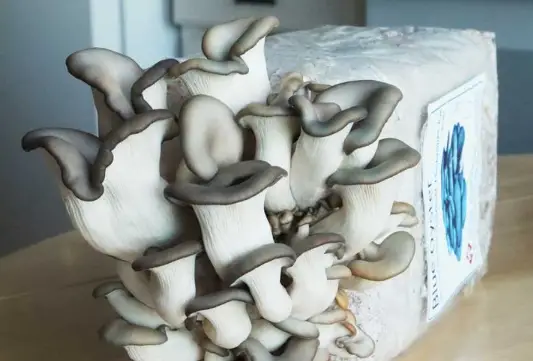
Yes, you can grow mushrooms at home using mushroom cultivation kits or by preparing your substrate and inoculating it with mushroom spores or mycelium. Popular mushrooms for home cultivation include oysters, shiitake, and button mushrooms.
What are the health benefits of eating mushrooms?
Mushrooms are low in calories and fat and are a good dietary fiber, vitamin, and mineral source. They also contain antioxidants and other bioactive compounds that may have potential health benefits, such as supporting the immune system and potentially reducing the risk of certain diseases.
How should I store fresh mushrooms?
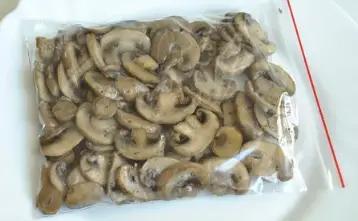
Fresh mushrooms should be stored in a paper bag, wrapped in a damp cloth, and placed in the refrigerator. Avoid storing them in plastic bags, as this can cause them to become slimy and spoil more quickly.
How do I cook mushrooms?
Mushrooms can be cooked in various ways, including sautéing, grilling, baking, or adding them to soups, stews, and stir-fries. Cooking methods will vary depending on the type of mushroom and the desired texture and flavor.
How can I remove mushroom stains from clothing or fabric?
It is best to treat mushroom stains as soon as possible to remove them. Rinse the stain with cold water and apply a stain remover or pre-treatment solution. Then, launder the fabric as usual, following the care instructions on the label.
Conclusion
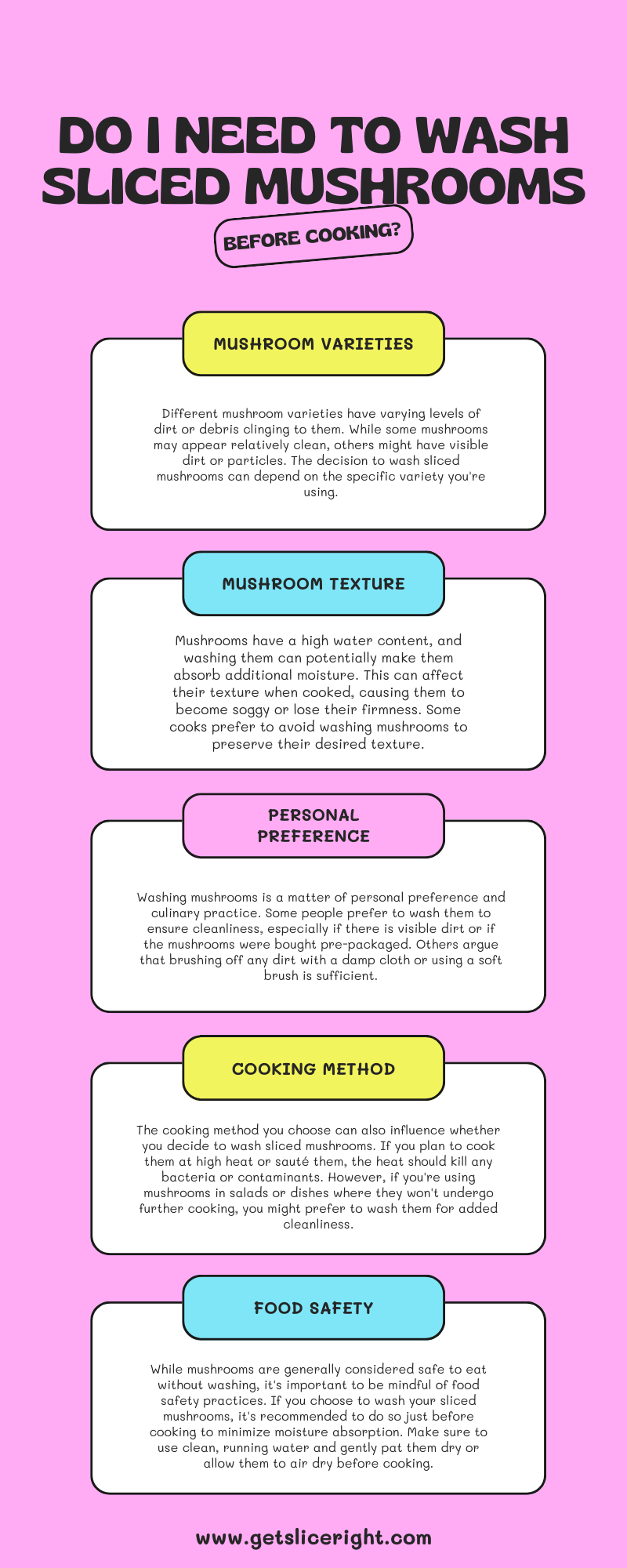
You can wash sliced mushrooms before cooking, but it is unnecessary. Sliced mushrooms are already washed and cleaned during the washing and packaging, so cooking them without additional cleaning is safe. Ultimately, it comes down to personal preference – but in general, washed mushrooms are ready for cooking as they are.

Mario Batali is a renowned author, food enthusiast, and passionate chef who has dedicated his life to exploring the world of culinary arts. With a love for sharing his knowledge and experiences, Mario has become a prominent figure in the food blogging community, inspiring countless readers with his creativity and expertise.
In addition to his culinary prowess, Mario Batali is also a talented writer with a flair for engaging storytelling. He launched his own food blog to share his recipes, cooking tips, and personal experiences in the kitchen. Over time, Mario’s blog gained a loyal following of food enthusiasts who appreciate his unique approach to cooking and his dedication to using only the finest ingredients.
Mario Batali’s passion for food and his commitment to sharing his knowledge with others have made him a true inspiration in the world of culinary arts. Through his blog, cookbooks, and public appearances, Mario continues to spread his love of food and the joy of cooking with his ever-growing fanbase.






